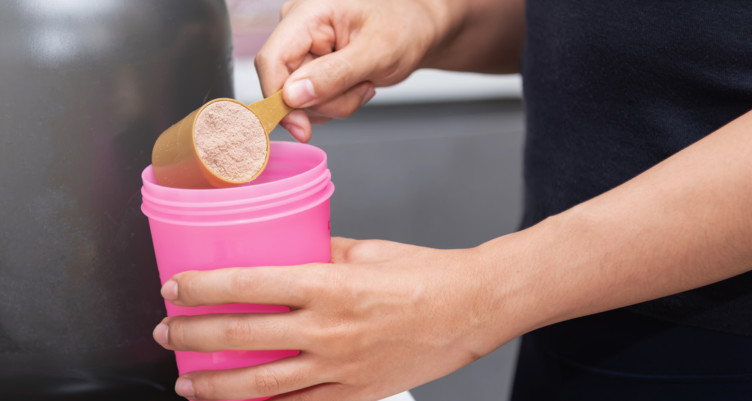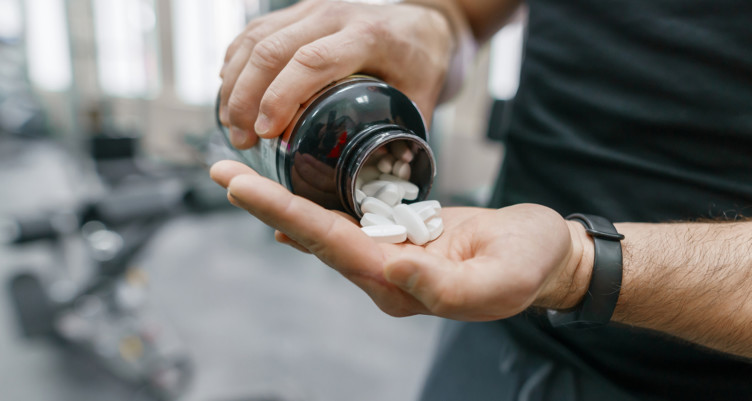Is Beta-Alanine Worth It to Boost Muscle and Workout Performance?

- Beta-alanine is a popular amino acid supplement taken by athletes and fitness enthusiasts.
- Beta-alanine is also available through certain foods and offers potential anti-aging and performance benefits.
- Discover the optimal dosage of this non-essential amino acid, along with its science-backed benefits.
Whether you’re just starting your fitness journey or you’re ready to level up your results, it’s only a matter of time before exercise supplements come onto your radar. Once you go beyond the basic proteins and hydration drinks, you’ll start looking into supplements that are more targeted to your goals.
Beta-alanine is popular with fitness gurus as a way to help your muscles squeeze out an extra rep or add more weight to your sets. Plus, it’s often used for endurance-based activities. But does the science back it up? Is beta-alanine worth it for avid gym goers trying to build lean muscle and lose body fat? We’re here to answer all the questions about an amino acid that may just become part of your supplement stack.
What is beta-alanine?

Beta-alanine is an amino acid that doesn’t do much for your body on its own. It gets its superpowers when it binds with histidine, another amino acid. The two combined can make a dipeptide, carnosine, which adds strength to your muscle contractions and delays muscle fatigue.[1]
Histidine levels in your body are typically on the high side, and your levels of beta-alanine are typically low. You can only make as much carnosine as your beta-alanine levels allow. So, if you take beta-alanine, your body can make more carnosine. The carnosine that you don’t use gets stored in muscles for workouts to come.[2]
Beta-alanine supplementation isn’t just a popular pre-work out practice for those looking to achieve their body composition goals. Research shows that the increased carnosine from utilizing this dietary supplement can have anti-aging benefits, including improved muscular workload and increased capacity for muscular work in older adults.[3] There is also early animal-based evidence that increased levels of carnosine may help preserve and protect mitochondrial function that traditionally degrades with age.[4]
While supplementing with beta-alanine is common, this compound is also found in several foods, including meat, poultry and fish. (This makes supplementing particularly important for vegetarians.) Beta-alanine is a non-essential amino acid, a building block of proteins, which means your body is able to produce it on its own, without supplementation. However, it is stored in relatively small amounts. The other amino acid that forms carnosine, histidine, is stored in larger quantities, but your body can only synthesize carnosine based on the amount of beta-alanine present.
Adding a beta-alanine supplement to your stack will boost the production of carnosine beyond what your body can do on its own, giving you an edge when it comes to strength training.
Related: Is NAD+ the Anti-Aging Miracle Pill? Here’s What the Science Says
Benefits of beta-alanine
If you’ve hit a plateau in your strength training or bodybuilding plan, a little boost to your skeletal muscles might be just the thing to increase muscle growth. Because of carnosine’s ability to help decrease lactic acid buildup in the muscles and thereby limit muscle fatigue caused by taxing forms of exercise like interval training and high-intensity interval training (HIIT), you’ll be able to push your muscles further than before and get over the proverbial hurdle.
Beta-alanine improves exercise performance

Athletes and sports nutrition fans use beta-alanine to improve overall exercise performance.[5][6][7] Supplementing with beta-alanine has been shown to improve sprint performance,[8] high-intensity exercise,[9][10] and strength performance.[11]
Beta-alanine acts by being part of carnosine, which can help make your muscle’s use of energy more efficient by acting as a pH buffer.[12] What exactly is muscle metabolism? Essentially, all of our muscles consume energy to do work. The energy to perform that work is provided by adenosine triphosphate (ATP). As we perform moderate to intense exercise, hydrogen ions build up in muscle tissue, decreasing the pH of the muscle. ATP is produced by glycolysis, which also creates lactic acid as a byproduct. Increasing the amounts of hydrogen ions and lactic acid in the muscle leads to greater fatigue and less ability to withstand work.
There is evidence that carnosine acts as a pH buffer, helping to regulate pH within the muscle, which means that higher muscle carnosine levels can increase muscular endurance and exercise capacity before fatigue sets in.[13]
So, beta-alanine supplementation can provide a valuable assist in muscle endurance and exercise performance.
Related: All the Reasons You Need to Drink Coffee Before Your Workout
Beta-alanine supercharges creatine

People use creatine monohydrate to increase the intensity of their workouts because it helps your muscle cells produce energy. That means more weight, more reps, more power output and more muscle mass in less time. Studies show beta-alanine used in conjunction with creatine helps you push a little further and delays muscle fatigue.[14][15]
Creatine isn’t just for muscles. You can read more about the full-body benefits of creatine here.
Suggested beta-alanine dosage and when to take beta-alanine

Whether you have specific body composition goals or you simply want to put yourself in the optimal position to succeed in the gym, supplementing with beta-alanine can go a long way. But how much should you take and when?
Here’s an easy way to get started:
Exercise days: Start with 1 gram of beta-alanine, and work your way up to 2 grams as a pre-workout supplement. Some people add another gram or two post-workout, but that’s up to you and your fitness level.
Rest days: 2 grams in the morning, with creatine
Note that users have reported a tingling sensation in their skin after taking beta-alanine. This is known as paresthesia, which can feel similar to a niacin flush. While researchers haven’t proven definitively why this side effect of beta-alanine happens, there is evidence that it triggers certain receptors, many of which are in the skin, that send signals to the central nervous system. There is no evidence that the sensation leads to long term damage, but if it bothers you, you can decrease your dose until the sensation no longer occurs and still benefit from beta-alanine supplementation.[16][17]
The bottom line: Is beta-alanine worth it from a performance perspective? The science backs up why this non-essential amino acid is one of the most popular supplements in the fitness industry. Plus, evidence shows there are potential anti-aging benefits of beta-alanine supplementation. As long as you follow a well-formulated protocol, you can look forward to less lactate, more muscular endurance and better performance in the gym.
Ready to take your training to another level? Learn about the best workout supplements to add to your stack so you can reach your goals even faster.
Sign up for early access to sales, product launches, the latest Bulletproof news and more!



